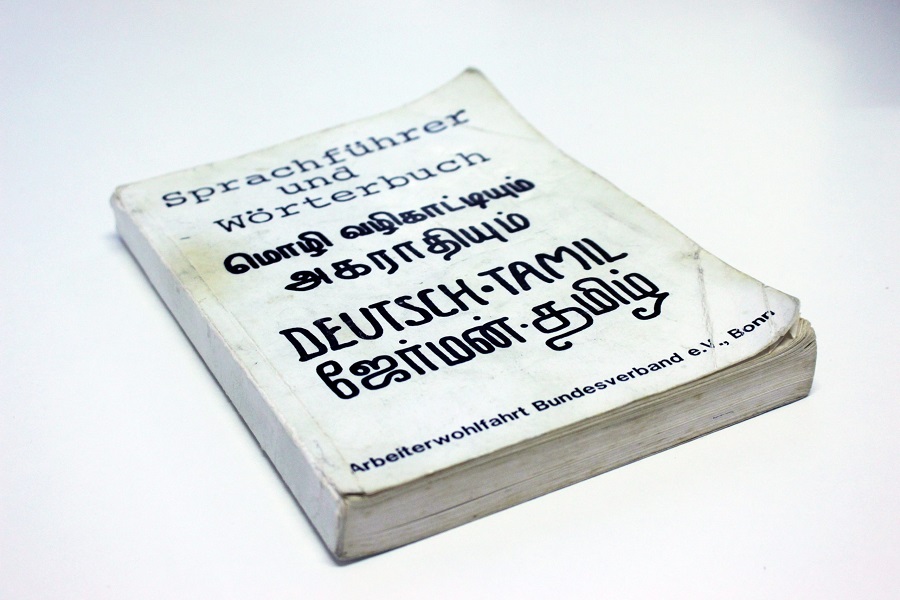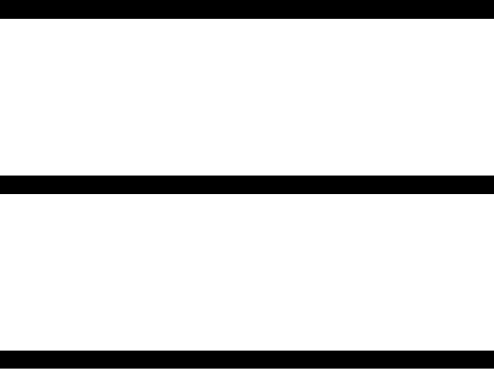Open Call for the 5th Istanbul Design Biennial
9 February 2020Glasgow International Announces Details of 2020 Programme
11 February 2020
Phrasebook and dictionary, German – Tamil (detail), 1989
Courtesy Berlin Biennale for Contemporary Art
11th Berlin Biennale
epilogue
June 13 – September 13, 2020
https://www.berlinbiennale.de
Dates
Public opening: Friday, 12.6.2020, 7 pm
First exhibition day: Saturday, 13.6.2020, 10 am–7 pm
Press conference: Thursday, 11.6.2020
Press preview: Thursday, 11.6.2020 and Friday, 12.6.2020, 10 am–6 pm
Professional preview: Friday, 12.6.2020, 10 am–6 pm
Venues
11th Berlin Biennale c/o ExRotaprint
Bornemannstraße 9
13357 Berlin
daadgalerie
Oranienstraße 161
10969 Berlin
Gropius Bau
Niederkirchnerstraße 7
10963 Berlin
KW Institute for Contemporary Art
Auguststraße 69
10117 Berlin
epilogue – 11th Berlin Biennale
The 11th Berlin Biennale for Contemporary Art is curated by María Berríos, Renata Cervetto, Lisette Lagnado, and Agustín Pérez Rubio. The members of this intergenerational, female identified team of South American curators envision the forthcoming edition of the Berlin Biennale as a series of lived experiences that evolve as a process. It begins with three sequential moments, exp. 1, exp. 2, and exp. 3 (experiences), unfolding from September 2019 to May 2020, which attempt to learn from and build sustainable relations, not only with participating artists and projects but as importantly, with the city and people of Berlin. The program includes exhibitions, performances, artist residencies, lectures, presentations, and workshops. In summer 2020, the upcoming edition of the Berlin Biennale will bring forth all experiences at four venues.
“We began by asking how to celebrate the complicated beauty of life as the world burns around us. Baring ourselves through the stories that carry us, asking what can be, what is being mobilized today. For the epilogue, these lived experiences merge, cumulate, and fall out with one another; sometimes even leaving each other behind like abandoned buildings. This nearing moment is not only about old skeletons dear to us, but more importantly about listening to the songs of the living bodies that make up our cities. It is about grasping how these moving bodies inhabit and transform the places people call home—not the precarious shelters and walls built to defend the inadmissible present, but those exchanges and support structures of shared fragility that sustain people. How do we care for those worlds that separate us and at the same time bring us together, preparing us for new collisions, for turbulences yet to come? Up against the dismantling anxieties and crises brought on by fear and hate, the violence that surrounds us, that we are part of. Solidarities of vulnerabilities in struggle push forward multiple unrehearsed uprisings of beautiful rage.”
(María Berríos, Renata Cervetto, Lisette Lagnado, Agustín Pérez Rubio)
The epilogue of the 11th Berlin Biennale takes place from June 13 to September 13, 2020 at four permanent exhibition venues: 11th Berlin Biennale c/o ExRotaprint, daadgalerie, Gropius Bau, and KW Institute for Contemporary Art.
11th Berlin Biennale c/o ExRotaprint
The 11th Berlin Biennale space at ExRotaprint—a tenant-run project initiated by artists, bringing together work, art, and community—has been a space for the 11th Berlin Biennale’s diverse experiences since September 2019.
ExRotaprint is a model for urban development that rules out financial profit through ownership and establishes a heterogeneous, open environment for all parts of the community. The former site of the Rotaprint AG printing press manufacturing plant with its buildings dating from the 1950s is located in Berlin’s Wedding neighborhood. In 2004 visual artists Daniela Brahm and Les Schliesser formulated a concept for on-site tenants to take over the property. The goal was to develop the location to serve a heterogeneous mix of uses for “Arbeit, Kunst, Soziales” [work, art, community] and to achieve affordable rent for all. Since 2007, the tenant-founded, non-profit ExRotaprint gGmbH has been dedicated to the restoration and development of the 10,000-square-meter property. Today, ExRotaprint hosts over one hundred social initiatives, businesses, and spaces for independent artists and others working in the creative sector.
daadgalerie
In 1965, with the help of the former West Berlin Senate, the DAAD [German Academic Exchange Service] took over the “artists-in-residence program” initiated two years earlier by the Ford Foundation. Under the new title “Berliner Künstlerprogramm des DAAD” [DAAD Artists-in-Berlin Program], it became a renowned support program for international artists, writers, and musicians, and later also for filmmakers. In 1978, the daadgalerie opened as a new exhibition venue in former West Berlin. The location was intended to bring together the diverse activities of the artists’ program and offer international guests a platform within the West German cultural scene. Since 2017, the daadgalerie has been located at Oranienstraße 161 in Kreuzberg in “Haus Stiller.” The residential and commercial building was designed in 1910 by the Jewish-Hungarian architect Oskar Kaufmann. Interdisciplinary exhibitions and events by current and former guests of the program are shown on two floors. A dialogue with the local art scene and other institutions in the city is the primary focus.
Gropius Bau
In 1881, the Gropius Bau opened as a museum and school of decorative arts. In view of its eventful history and the variety of institutions that have been active here over the years, the Gropius Bau is organized as an open framework for addressing a broad variety of artistic practices and modes of thinking. Since Stephanie Rosenthal took over as director in 2018, the program has focused on opening up the institution as a location for artistic creation and exchange. The active collaboration with contemporary artists aims at revealing creative processes, presenting new perspectives, and reflecting the possibilities of the institution. A central reference point for the program is also the nuanced examination of the building’s geographical location, history, and present-day status, including questions of land, borders, trauma, care, and repair.
KW Institute for Contemporary Art
Since its inception in the early 1990s, KW Institute for Contemporary Art has devoted itself to the central questions of our times through the production, presentation, and dissemination of contemporary art. The Berlin Biennale for Contemporary Art, which was launched soon after, emerged from a pressing desire for an extensive dialogue with the international discourse around contemporary art. In addition to other venues across the city, the Berlin Biennale has regularly used KW’s exhibition spaces since 1998. Numerous outstanding artists and internationally renowned curators have since realized important new works and exhibition projects there, establishing the two institutions located under the roof of KUNST-WERKE BERLIN e. V. as vibrant venues for progressive artistic practices, both within the Berlin art scene and internationally.



